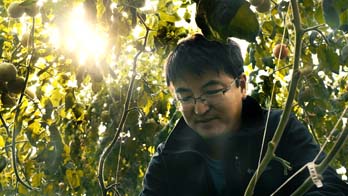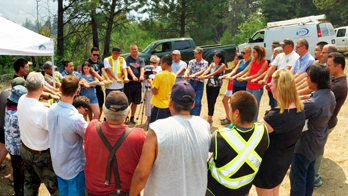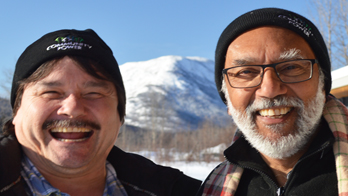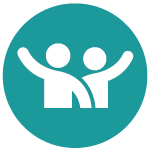Dr. Feng Jiang, a University of British Columbia professor originally from China, is on a mission to replace plastics with biodegradable materials—and his work with the Wet’suwet’en First Nation could help build economic prosperity for First Nations in the province.
#ImmigrationMatters in Vancouver, British Columbia – Partnering with an Indigenous community to fight plastic pollution
Partnering with an Indigenous community to fight plastic pollution
April 17, 2023
Share:

Burns Lake—home to the Wet’suwet’en First Nation in central British Columbia—is an area of forested natural beauty. However, over the years, a devastating combination of wildfires, mountain pine beetle infestations and logging has left a generous amount of wood waste on the forest floor.
A few years ago, Reg Ogen, a Wet’suwet’en First Nation band member and the CEO and president of the Yinka Dene Economic Development Limited Partnership (YLP), began to investigate the possibility of turning these wood scraps into an economic opportunity for his community.
In 2019, he spoke about the Wet’suwet’en First Nation bioeconomy and wood waste at a workshop organized by the BC Ministry of Forests. As luck would have it, Dr. Feng Jiang was listening.
Dr. Jiang, an assistant professor in the Department of Wood Science at the University of British Columbia (UBC), has devoted his career to creating new products made from natural ingredients.
Dr. Jiang was able to combine his expertise with cultural awareness and respect for the Wet’suwet’en people. When we talked, he listened—and for our culture, that’s big.
Reg Ogen, president and CEO of Yinka Dene Economic Development Limited Partnership
Originally from China, Dr. Jiang moved to Canada in 2017 after a decade in the United States, where he earned his PhD. He started his lab in 2018 and became a Canada research chair soon after.
Listening to Reg was a lightbulb moment for Dr. Jiang and for Dr. Yeling Zhu—a postdoctoral researcher at UBC, also originally from China. The two scientists got to work in their lab, determining how to turn the wood scraps into a biodegradable foam that could replace styrofoam as a protective packaging material. The formula they developed adds non-toxic chemicals to mashed wood fibre before the proprietary mixture is baked at a low temperature. The wood-based foam degrades naturally within a few months.
“Solving a small part of the plastic problem is what energizes and motivates me,” Dr. Jiang says. “I just want to do something to help.”
For Dr. Zhu, collaborating with the Wet’suwet’en First Nation has been rewarding and he is inspired by the opportunity to contribute to science, sustainability and First Nations prosperity. It’s a win-win for science and the environment that may also bring opportunities to First Nations.
Reg deeply appreciates Dr. Jiang and Dr. Zhu’s respectful approach: “They see the need to respect the owners of the land. When we talked, Dr. Jiang listened, and he understood right away. I think he realized his science could help enhance the well-being of Indigenous communities.”
YLP is providing the raw materials for the biodegradable foam. UBC and YLP will share the intellectual property, and the First Nation will have exclusive licensing rights.
An important benefit of the project will be jobs. The first step will be to build a small pilot plant near Burns Lake. It will employ just a handful of people initially, but the partners hope the project will eventually expand across Western Canada, benefiting numerous Indigenous communities and fostering the bioeconomy.
Immigration profile: Vancouver, British Columbia
Quick facts:
- Immigrants represent 41% of the Vancouver area population.
- More than 58% of immigrants who came to the Vancouver area between 1980 and 2016 were economic immigrants, while nearly a third (31%) were sponsored by family and 9% were refugees.
- About a third (34%) of people working in scientific research and development services across Canada are foreign born.
- Almost 1 in 4 people (23%) are or were at some point landed immigrants or permanent residents in Canada—the highest proportion since Confederation.
Did you know?
- Because of its internationally recognized quality of life and post-secondary educational institutions, Canada attracts talent from around the world to help build the country’s economy and grow the science and technology sector.
You may also be interested in ...
 Introducing new farming techniques to Western Canada
Introducing new farming techniques to Western Canada
Using solar greenhouse technology, a geologist from China is helping Albertan farmers extend their growing season.
 Engineering cleaner water in remote communities
Engineering cleaner water in remote communities
RES’EAU-WaterNET, a program started by Dr. Madjid Mohseni, originally from Iran, has helped 4 First Nations communities lift drinking water advisories and 8 small communities improve the quality of their drinking water.
 Empowering communities to save money and energy
Empowering communities to save money and energy
Areef Abraham is working with Indigenous communities to be more energy efficient, one home at a time.
Page details
- Date modified:




